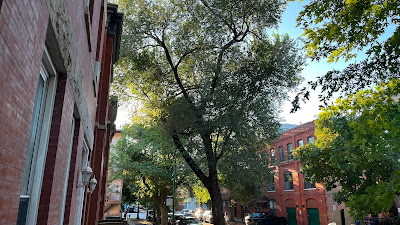Tree care, food composting programs branch out
Neighborhood preservation and beautification were on the agenda in September when EVA welcomed representatives from TreeKeepers and Block Bins.
Urban forestry tips from TreeKeepers
TreeKeepers is a group of volunteers, including neighbor and presenter Micol Werner Seferin, trained to care for Chicago’s public trees. Our “urban forest” includes all trees in the public way, such as those along sidewalks and in parkways and parks. These trees are property of the City of Chicago and residents are not allowed to prune them, but Seferin suggested many activities we can do to keep our trees healthy and beautiful:
- Water: trees need approximately 15-20 gallons of water weekly (if it has not rained). We can tell it’s time when the soil around the tree is dry. Make sure to pour water slowly at the base of the tree.
- Signs: Remove signage for street sweeping, plowing, construction, no parking, etc.
- Roots: Keep the area around the base of the tree clear of debris or overgrowth from other plants, and do not build physical barriers that can block roots.
- Mulch: Ideally, use mulch from the same kind of tree, but if that isn’t available, make sure to use something natural and avoid mulch that won’t become soil in the future. Keep mulch placed around the tree more than 4 inches away from the base. It is tempting to build the mulch up into a volcano shape around the base, but this can cause rotting in the trunk.
- Call 311: A city crew will respond in the event of a tree emergency or if the planting of a new tree is requested.
To learn more, find resources at Chicago Region Trees Initiative (chicagorti.org) and Openlands (openlands.org), or read the Tree Owner’s Manual from the U.S. Department of Agriculture (treeownersmanual.info).
Block Bins promotes food scrap composting
Food scraps create 20% to 30% of the waste in Chicago. They attract and feed rats when put in the waste bins in our alleys, and they fill landfills with organic material that releases methane and other greenhouse gases as they decompose, degrading our immediate and greater environments. Composting is a great way to divert this waste away from landfills and put food scraps to work creating soil and harnessing the power of the released gases.
The Chicago Department of Streets and Sanitation and NeighborSpace have partnered on a pilot program to test composting in Chicago; however, the program is currently limited and not available to all residents. To bridge the gap for those who are interested, there are a few private composting companies offering services for a fee.
Kyle Preuss, chief marketing officer of Block Bins, joined EVA to discuss the benefits of composting, and specifically their easy and accessible curbside program. Subscribers rent space in a shared bin placed in an alley alongside the current waste and recycling bins. Each bin is rat-proofed and secured with a combination lock—the code is only provided to subscribers<./p>
Subscriptions start at $10/month, and subscribers have the option of joining an existing bin or requesting a new one. Pickups start on a monthly basis and scale up as needed. All collections go to Green Era, a local company in Auburn Gresham focused on “community education, food access, and climate resiliency strategies”. More information can be found at blockbins.com and greenerachicago.org.
There will be no October membership meeting. The EVA board will meet ar 7pm Oct. 2.




